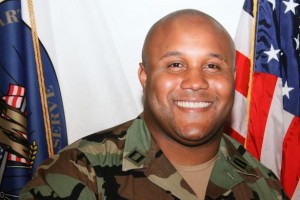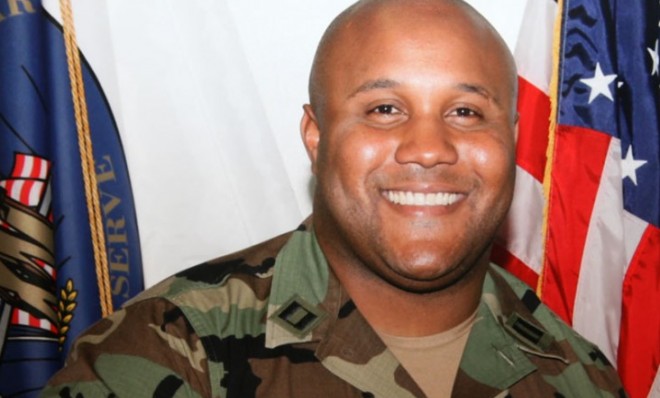 I was not the first person to hear about elite former police and naval officer Christopher Dorner’s campaign of violence to avenge the disgrace and slander he alleges was wrongly perpetrated against him by officers of, and attorneys and officials affiliated with, the Los Angeles Police Department: acts which led to his termination as a police and naval officer and the ruining of his career and, according to Mr. Dorner, his personal life as well. I didn’t start to catch on to this story until hearing some chatter on the radio Thursday morning about a former Los Angeles police officer gone rogue, and then listened to snippets of the manifesto he posted online detailing the story behind his vendetta, as well as his arbitrary opinions on a long list of other issues and people. My interest developed, but it wasn’t until I saw Chief of Police Charlie Beck addressing the press from a secured room that I realized that there was an unusual dynamic in place in this murderous tale. The Los Angeles Police Department is scared. And with one of their own dead, downed after exchanging gunfire with the suspect in Irvine, and two other cops wounded at the hands of one of their most capable officers, they have good reason to be. Christopher Dorner remains at large. The search for him is wide ranging, fanning out now to the snowy mountains of Big Bear, where he is thought to be concealing himself in the wintry cold, though no one knows for sure. They, with the rest of the city and even the country, wait with bated breath to see if and when he strikes again, hoping only that the police find him before he does.
I was not the first person to hear about elite former police and naval officer Christopher Dorner’s campaign of violence to avenge the disgrace and slander he alleges was wrongly perpetrated against him by officers of, and attorneys and officials affiliated with, the Los Angeles Police Department: acts which led to his termination as a police and naval officer and the ruining of his career and, according to Mr. Dorner, his personal life as well. I didn’t start to catch on to this story until hearing some chatter on the radio Thursday morning about a former Los Angeles police officer gone rogue, and then listened to snippets of the manifesto he posted online detailing the story behind his vendetta, as well as his arbitrary opinions on a long list of other issues and people. My interest developed, but it wasn’t until I saw Chief of Police Charlie Beck addressing the press from a secured room that I realized that there was an unusual dynamic in place in this murderous tale. The Los Angeles Police Department is scared. And with one of their own dead, downed after exchanging gunfire with the suspect in Irvine, and two other cops wounded at the hands of one of their most capable officers, they have good reason to be. Christopher Dorner remains at large. The search for him is wide ranging, fanning out now to the snowy mountains of Big Bear, where he is thought to be concealing himself in the wintry cold, though no one knows for sure. They, with the rest of the city and even the country, wait with bated breath to see if and when he strikes again, hoping only that the police find him before he does.
Of course, not everyone is hoping the cops do find him, and that is the part of this story which is most interesting to me. While the mainstream media and most people are portraying Dorner as a murderer who needs to be brought to justice, many people, and very many within the black community in Los Angeles, have more than a little bit of sympathy for the plight and crusade of Christopher Dorner. We, after all, know the dark side of the LAPD better than any other group in this massive city of Los Angeles, and the corruption and brutality of Los Angeles city police officers historically speaking is something that even they do not dispute. Dorner puts himself forward as an avenger of those who have suffered at the hands of the LAPD, as the just punisher of the sins of the department which have driven him to this point. He writes, “I saw some of the most vile things humans can inflict on others as a police officer in Los Angeles. Unfortunately, it wasn’t in the streets of LA. It was in the confounds of LAPD police stations and shops (cruisers). The enemy combatants in LA are not the citizens and suspects, it’s the police officers.” Black people of inner city Los Angeles have little problem believing that, being the children of the Watts riots, the Los Angeles riots and Rodney King. And as I hear people talk about Dorner, not all of them black by any means but many of them, with subtle and not so subtle tones of admiration for his willingness and his ability to intimidate the most feared police department in America, I understand. I understand the historic mistrust and animosity we have towards the police, and it does not strike me as unbelievable that every word of Mr. Dorner’s testimony might be the truth. Liars are seldom so motivated by their own lies as this man is. But it does not make him worthy of our admiration. It does not erase the horror of the terrible things he is reported to have done.
Because of Christopher Dorner, the former first lady of the Church I attend has lost a step son; Keith Lawrence, the fiance of Monica Quan, both of whom he supposedly shot to death in a car in Irvine simply because Ms. Quan was the daughter of a police Captain Dorner blamed for his misfortune; two individuals who had nothing to do with the injustices Mr. Dorner allegedly suffered at the hands of the LAPD. I can think of no greater hypocrisy than to accuse some people of treating innocent people unjustly, and then to turn around and take vengeance by murdering innocent people oneself. Had he confined his retribution merely to those against whom he may have had legitimate grievances he would still be wrong. But to expand his carnage to those so completely undeserving makes him more than misguided; it makes him as bad and worse than those whose supposed corruption has brought him to this terrible point, where he has made himself judge and jury, meting out death and punishment not only to those who may be guilty, but also to those who certainly are innocent.
I do not hate Christopher Dorner. I feel sorry for him. He is compelling because in his writings one can easily perceive the thought processes of a rational, even thoughtful individual. In reading his manifesto, I felt great remorse that such a person could be twisted by circumstances to become such a distortion of what I imagine to be his former self. The record seems to indicate that this was once a man of integrity, though he deludes himself to think he is such a man now. Nevertheless, if the culture of corruption Mr. Dorner illustrates in his manifesto is even half true, than such perversions of justice in the halls of the police department must too be reckoned with. That a man’s reputation can be destroyed for bringing to light the crimes of his fellow officers is a sin almost as serious as the crimes Dorner has perpetrated, and even worse when one extrapolates the consequences such corruption has for this great city of Los Angeles that the LAPD is meant to protect and serve. It is by no means to condone Christopher Dorner to say that if these sorts of incidents which he has described do indeed persist in our police force (and there is more evidence than this that they do) than it is right for this to be a come to Jesus moment for those who govern the force, and shape the system.
I wish the Los Angeles Police Department luck in bringing Christopher Dorner to justice. Then I wish honest officers and city, state and federal officials, as well as the people of Los Angeles through the legitimacy of the democratic process, the utmost luck in bringing justice to the criminal elements of the LAPD.


